I. BACKGROUND:
Ever since the Chinese government initiated a robust trade relationship with the continent back in the year 2000, the globe-spanning Euro-American corporate media have been working overtime to paint a cartoonish image of that milestone.
In the virtual fantasy world created by the media propagandists, China is “colonizing a continent of hapless, poor sods who are apparently too stupid to notice.” What makes the whole thing hilarious is that the journalists, pundits and government officials saying these things often hail from European countries that colonized the continent back in the 19th century.
Of course, back in the real world, the Africans are not docile and hapless. They fought for their independence from the colonial empires of Europe. In some cases, they picked up machine guns, rockets and bombs and used it to force the European colonial empires to retreat. So, if Africans feel that China is colonizing them, they will act accordingly.
Claims that Zhongnanhai is solely interested in natural resources is belied by the fact that the Chinese state is also fully engaged with several African states that have no natural resources to offer. Rwanda and Malawi are good examples.
Obviously, China is not in Africa merely for the purposes of charity work. Trade relations with the continent have opened up new markets for Chinese-manufactured goods. Contrary to widespread assumptions in the Western world, Africans are also interested in acquiring vehicles, radios, televisions, refrigerators, motorcycles, phones, computers, kitchen appliances, etc.
The reluctance of Western companies to expand beyond natural resource extraction has left the field wide open for sales distribution firms from China, India and Gulf Arab nations to supply ordinary Africans with the aforementioned goods at reasonable and affordable prices.
Despite non-stop propaganda from Euro-American corporate media outlets, several polls conducted in the past by Gallup Inc., Pew Research Centre and other polling companies consistently show that majority of ordinary people in various African countries view China’s engagement with the continent in good light.

So why does the media propaganda fail to penetrate minds of ordinary people on the continent? Well, a look at this August 2022 article, with the clickable thumbnail below, might disabuse a few minds:
CHINA FORGIVES THE DEBT OF 17 AFRICAN NATIONS
Fourteen years ago, while in the UK studying for my doctorate in Process Systems Engineering, I wrote an article in a student magazine defending China's engagement with the continent of Africa. I tried my best to debunk virulent western media propaganda about China's trade relations with all 54 Africa nations, some of which have no natural resources tha…
Moving on to the main topic of the article…
II. AFRICAN LEADERS AT THE FORUM ON CHINA-AFRICA COOPERATION (FOCAC)
The 24th Forum on China-Africa Cooperation (FOCAC) commenced on 4 September 2024 in Beijing, with 53 out of 54 African national leaders in attendance. The one that failed to attend the Beijing summit was the military ruler of Burkina Faso, Captain Ibrahim Traore, who is busy battling jihadi terrorists who control 40% of his country’s total landmass. Burkina Faso was represented in Beijing by Apollinaire Joachim Kyélem de Tambèla, a token civilian member of the ruling military junta.
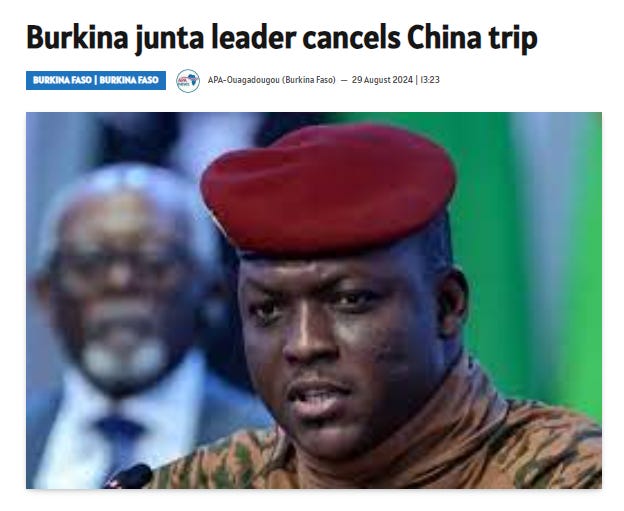
The near-hundred percent attendance rate of African leaders at the FOCAC summit starkly contrasts with the 2nd Russia-Africa Summit in July 2023, where only 19 African leaders were present, highlighting the differing geopolitical perspectives between Francophone and Anglophone Africa.
Out of the 19 Heads of State and Heads of Government who attended the Russia-Africa Summit, 10 were from the increasingly russophile Francophone African countries. In contrast, only 3 Heads of State attended the summit in person from Anglophone Africa. In other words, 53% of African leaders who attended the summit were Francophone, while a mere 16% were Anglophone.
Having said that, many Anglophone countries did send cabinet-level government ministers or even lower-ranking representatives to St. Petersburg— a visible reflection of the lower priority they assign to diplomatic relations with Russia in comparison to China, USA, and UK.
As usual, Nigeria treaded the middle path with regards to the Russia-Africa Summit. It neither sent the President nor a low-ranking government representative to St. Petersburg. It sent Vice-President Kassim Shettima who is the country’s second-highest ranking official after President Bola Tinubu. Russia is an important business partner of Nigeria, especially in the realm of space technology, defence and trade. Nigeria buys top-notch weapons from Russia. Nigeria’s first ever weather satellite was launched into outer space in 2003 by Russian Kosmos-3M rockets.
Five Anglophone countries, namely Kenya, Botswana, Mauritius, Sierra Leone, and Liberia, outright boycotted the Russia-Africa Summit by declining to send any official representatives to St. Petersburg.
At the time, Kenyan President William Ruto told the domestic media in Kenya that it was “inappropriate for Russia to be hosting a summit in the middle of a war.” He also criticized other African leaders for going to St. Petersburg.
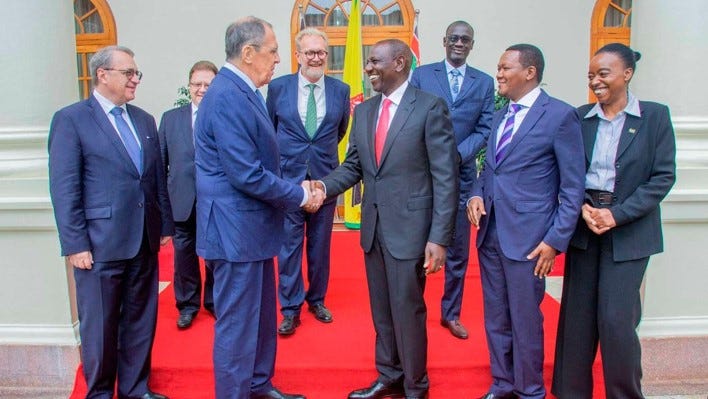
Again, as I have explained repeatedly in the past, the attitude of the Kenyan President and other Anglophone African leaders should not be construed as a sign of hostility towards Russia. It just means that these English-speaking countries prioritize relations with China, UK and USA at Russia’s expense. This is an issue that goes well beyond government officials. In fact, the prevailing attitude towards Russia among most ordinary people across Anglophone Africa is one of ambivalence. On the flanks of this large ambivalent majority are small minorities that are either intensely pro-Russian or intensely anti-Russian.
Exceptions to the general rule in Anglophone Africa are the nations of Zimbabwe, Namibia and South Africa, which contain large russophile populations still grateful for the historic assistance they received from the Soviet Union in their struggle against the local white minority ruling elites of the apartheid South African regime and the now defunct Rhodesia.

On the other hand, China enjoys mass support among ordinary people across the entire continent from Egypt in North Africa to South Africa at the bottom of Southern African subregion. This has to do with big construction projects undertaken by Chinese state-owned companies, which are making life easier for ordinary people, and growing business networks linking African entrepreneurs to individual Chinese businessmen and privately-owned small & medium scale companies in China.
Below is a video clip of President Xi Jinping on 24 August 2023 at the BRICS Summit in Johannesburg, South Africa, enumerating the fruits of Chinese state engagement with African countries over the decades:
Governments in Anglophone countries such as Kenya, Ghana, Botswana and Liberia, may not necessarily be keen on deepening their relations with Russia, but China is a completely different matter. None would pay any attention to requests by USA or Western Europe to downgrade ties with Beijing.
In March 2023, Vice-President Kamala Harris visited Ghana, Zambia and Tanzania to promote relations between USA and the Anglophone African countries with populations that lean heavily in the pro-Western direction. While on the visit, she asked the three countries to downgrade ties with “undemocratic” China. The answer she got back from each was a firm “No”.
During her visit to the Ghanaian city of Accra, the British-educated President Nana Akufo-Addo gave a long speech in which he recounted how many Ghanaians had benefitted from US government grants to study in American universities during the 1950s and 1960s. He also spoke affectionately of links between Ghanaian nationalist leaders and Black American civil rights leaders such as Martin Luther King and W.E.B Du Bois who spent his final years in Accra and died there on 27 August 1963.
And yet after paying tribute to his country’s strong relations with the United States, the same President Nana Akufo-Addo brusquely refused Kamala’s request that Ghana downgrade ties with China. He also rejected her attempt to intervene in a legislative bill concerning sexual morality, which was then going through the Ghanaian Parliament, stating that USA had no business interfering with it.
In a subsequent joint press conference with Kamala Harris, the Ghanaian national leader reiterated his defence of strong diplomatic ties with China to an enquiring American journalist:
In sharp contrast to his apathetic attitude towards Russia, Kenyan President William Ruto has praised China multiple times, including during his confrontation with Emmanuel Macron at an international finance summit hosted in Paris. In October 2023, Ruto travelled to Beijing for the tenth anniversary of the Belt and Road Initiative. While there, he dismissed the corporate media narrative about “China trapping Africa in debt” during an interview with the China Global Television Network (CTGN).
Currently, Ruto is among the 53 African leaders attending the 24th Forum on China-Africa Cooperation (FOCAC). As usual, the Chinese government is in a generous mood. President Xi Jinping recalled his country’s construction of roads, railways, schools, hospitals and industrial parks on the continent over the last twenty-four years.
On the first day of the summit, his government signed a deal with Zambia to revitalize the iconic Tanzania-Zambia Railway (TAZARA), which China constructed in the 1970s to pre-empt the threat of apartheid South Africa and Rhodesia cutting landlocked Zambia off from access to sea-borne international trade. Before TAZARA was built, Zambia’s access to international trade was solely through a pre-existing colonial era railway that passed through landlocked Rhodesia and terminated at the sea ports of apartheid South Africa.
As explained in a comprehensive article, the unsolicited offer made by Chairman Mao Zedong in 1965 to build TAZARA was initially turned down by Zambian and Tanzanian leaders for different reasons. Tanzanian President Julius Nyerere was reluctant to agree to such an offer as then poverty-stricken China was itself in dire need of infrastructure. Mao said China would postpone some domestic rail projects to help Zambia and Tanzania, but Nyerere still refused to take up the offer. Instead, he approached the wealthier Soviets for help.
Kenneth Kaunda, then the President of Zambia, rejected Mao’s offer because he was wary of “communist involvement” in any rail project involving his country. Although he was a firm believer in the highly heterodox Afro-socialism, and had decent diplomatic ties with China and all Warsaw Treaty nations, Kaunda’s priority was deepening relations with United Kingdom and fellow Commonwealth countries in Africa and Asia. Those deep Commonwealth ties made it possible for Kaunda to persuade India to loan some of its technocrats to Zambia. One such technocrat was Painganadu Venkataraman Gopalan— the maternal grandfather of Kamala Harris.
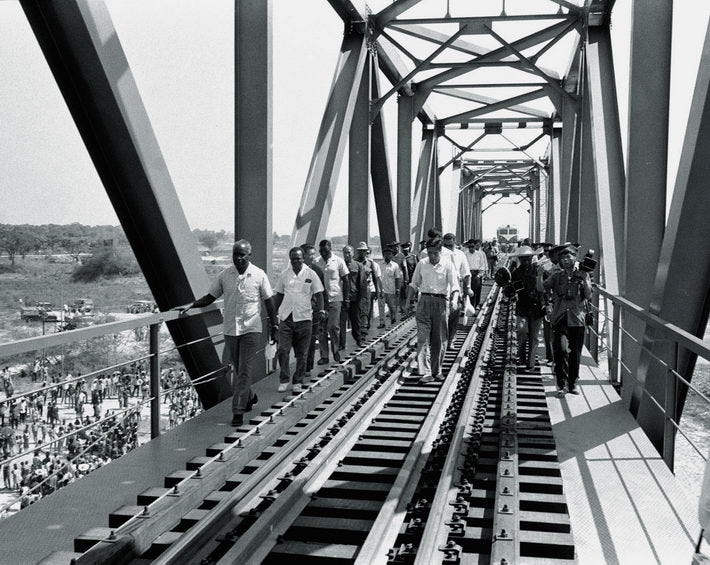
Both Nyerere and Kaunda got nowhere in their appeals to wealthier countries and supranational bodies. The UK, Japan, West Germany, USA, Soviet Union, World Bank, and the United Nations, all declined to provide any funds for the rail project. Kaunda reversed himself and accepted Mao’s offer while visiting China in January 1967, and the rest is history.
The liberation of Namibia (1990) from apartheid South African occupation, the emergence of the post-apartheid South African state (1994), the end of civil wars in Mozambique (1992) and Angola (2002) opened up multiple railway routes for the transport of copper and other commodities from landlocked Zambia to sea ports in neighbouring African countries.
The availability of cheaper and shorter alternative rail routes caused a drastic decline in the use of the more circuitous TAZARA route, which has increasingly become decrepit due to neglect.

TAZARA was China’s first ever construction project in Africa and also its largest single foreign-aid project undertaken anywhere in the world as of 2012. Therefore, China, for political reasons, is keen on keeping that iconic railway line running even though it is no longer Zambia’s primary mode of moving commodities in or out of the country.
At the current FOCAC summit in Beijing, President Xi Jinping pledged one billion dollars to refurbish TAZARA as part of a larger scheme to:
“improve the rail-sea intermodal transport network in East Africa, and build Tanzania into a demonstration zone for deepening high-quality China-Africa Belt and Road cooperation.”
At the previous FOCAC summit held in November 2021 in Beijing and the Senegalese capital of Dakar via video link, China pledged to purchase over $300 billion in imports from Africa. In the three years that have elapsed since then, it has been revealed that China has surpassed this goal, purchasing imports worth $305.9 billion.
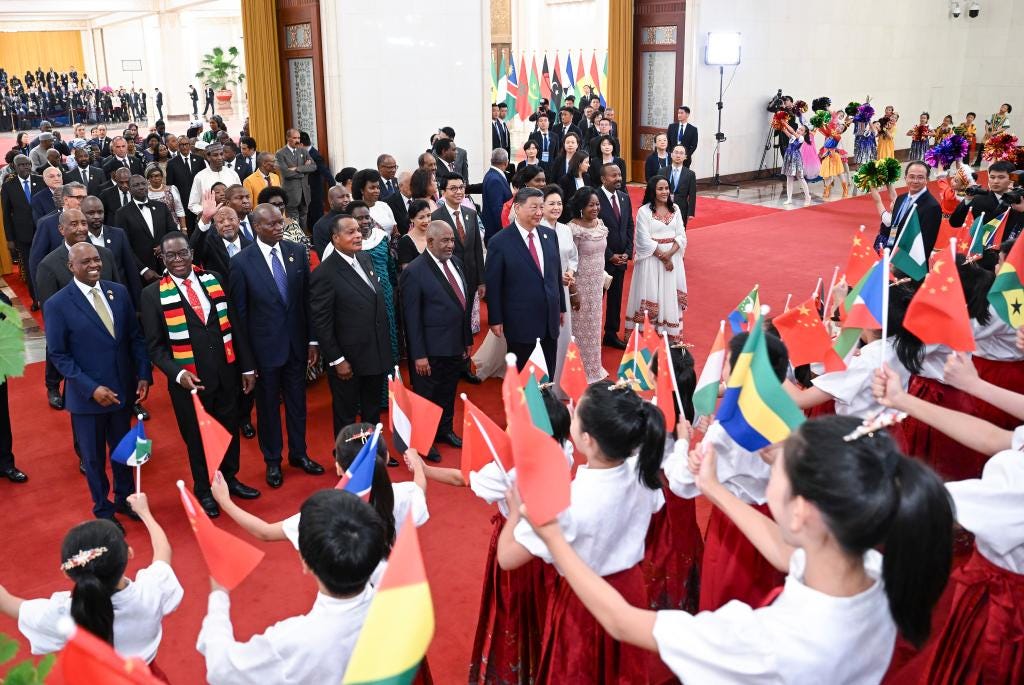
At this current FOCAC summit, Xi Jinping announced China’s intention to unilaterally open its markets wider to African goods, especially agricultural products. Furthermore, the Chinese government will grant all Least Developed Countries (LDCs) across the world, with diplomatic ties to Beijing, the opportunity to export their goods to China without any imposition of tariffs. 33 out of 54 African nations are classified as LDCs and would, therefore, be beneficiaries of the new Chinese trade programme. The Chinese President also pledged to deepen cooperation with Africa in e-commerce and other areas, and launch a “China-Africa quality enhancement programme.”
As he pledged an additional RMB 360 billion yuan (about $49.8 billion USD) in financial support to the continent over the next three years, he added:
We are prepared to enter into framework agreements on economic partnership for shared development with African countries to provide long-term, stable and predictable institutional guarantee for trade and investment between the two sides.
Perhaps, noting that many African countries, particularly the 33 least developed ones, may lack the industries to fully benefit from wider access to the large Chinese market, Xi Jinping also announced several schemes to help those countries develop industrial capacity. These schemes include:
Partnership Action for Industrial Chain Cooperation: aims to foster industrial clusters within Africa and launch an “African SMEs empowerment program.” China will also establish a digital technology cooperation center with Africa and launch 20 digital demonstration projects to collectively embrace the latest wave of technological revolution and industrial transformation.
Partnership Action for Agriculture and Livelihoods: involves the building of agricultural demonstration areas, sending 500 Chinese agricultural experts to the continent, and establishing a China-Africa agricultural science and technology alliance. 500 community welfare programmes would be implemented. China would encourage reciprocal investments for new business ventures involving both Chinese and African firms, enable Africa to retain added value, and aim to generate at least one million jobs on the continent.
Partnership Action for People-to-People Exchanges: aims to establish engineering technology academies and vocational education programmes. 60,000 training opportunities will be offered to Africans, with a focus on women and young people. As part of the Cultural Silk Road project, China would cooperate with African countries on cultural programmes on radio and TV. The Chinese government and African countries have already agreed to designate 2026 the China-Africa Year of People-to-People Exchanges.
Partnership Action for Connectivity: involves the execution of 30 brand new infrastructure connectivity projects in Africa. This partnership scheme also includes an offer of assistance in the development of the existing African Continental Free Trade Area established in 2018.
Partnership Action for Green Development: involves the launch of 30 clean energy projects in Africa and the creation of meteorological early warning systems. China would cooperate with African countries in disaster prevention, mitigation and relief as well as biodiversity conservation. Under this partnership scheme, a China-Africa forum on peaceful use of nuclear technology would be created along with 30 joint laboratories. China will collaborate with African countries on satellite remote sensing and lunar and deep space exploration.
Outside the partnership schemes listed above, President Xi Jinping declared that his country would grant countries of the continent RMB 1 billion yuan in military assistance, provide training for 6,000 military personnel and 1,000 police and other law enforcement officers from Africa, and invite 500 young African military officers to visit China. The two sides will engage in joint military exercises, training and patrols, undertake “actions towards a [landmine-free] Africa, and work together to ensure the safety of personnel and projects.”
He also pledged that China would invest in the building of hospitals and send 2,000 medical personnel to the continent. He added:
We will encourage Chinese companies to invest in Africa’s pharmaceutical production, and continue to do what we can to help Africa with epidemic response. We support the development of Centers for Disease Control and Prevention to strengthen public health capacity in all African countries.
Towards end of his keynote address to the 53 African leaders in Beijing, President Xi Jinping said that the RMB 360 billion yuan (about $49.8 billion USD) funding pledged for the partnership programmes would break down as follows:
RMB 210 billion yuan of credit line, RMB 80 billion yuan of assistance in various forms, and at least RMB 70 billion yuan of investment in Africa by Chinese companies.
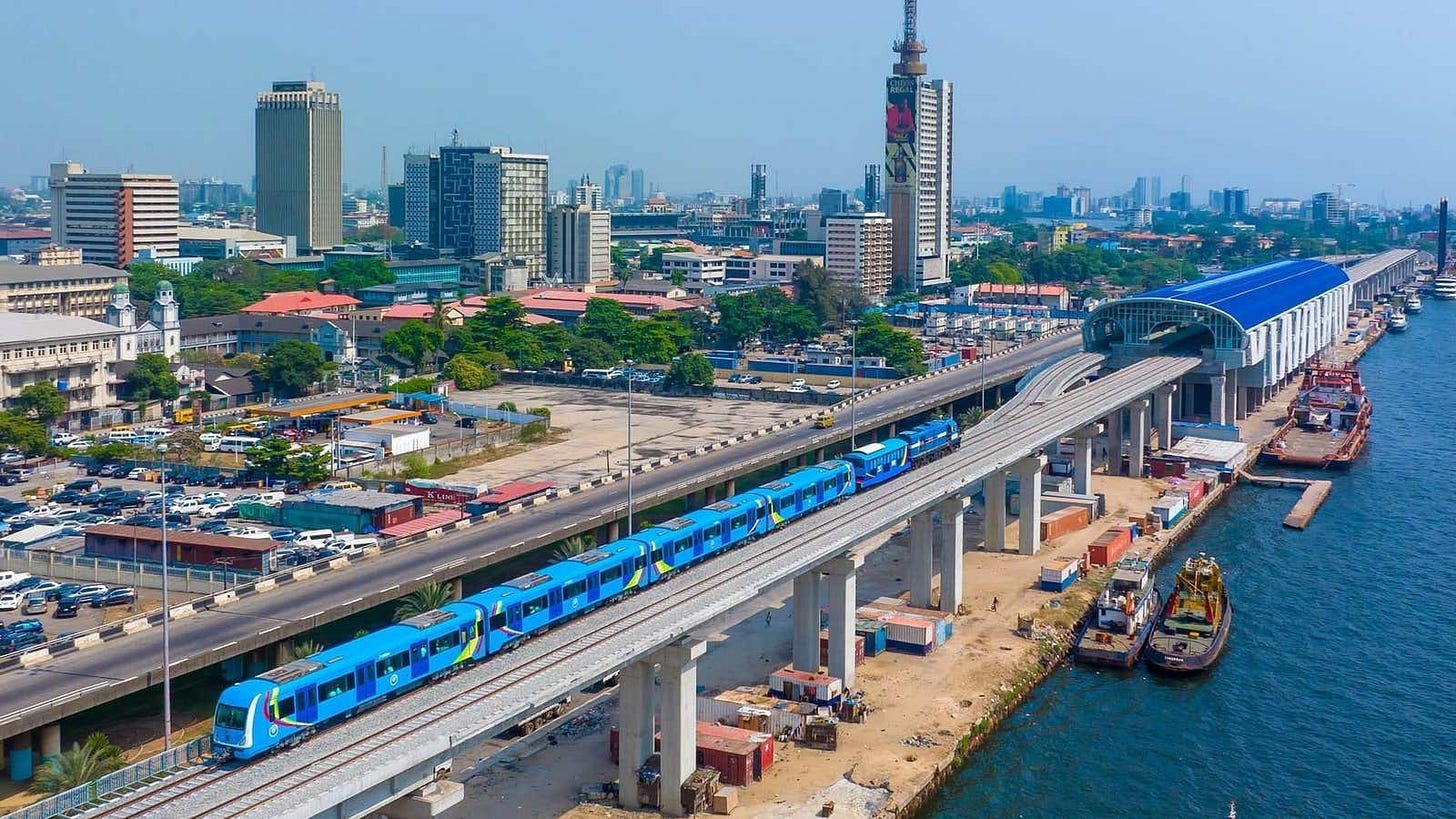
The pledges made by President Xi Jinping to African leaders appear to be highly ambitious, and almost reads like the tall campaign promises made to voters at a Lagos political rally helmed by a venal Nigerian politician wearing oversized babaringa robes and a rimless Aso oke cap.
However, the Chinese President is nothing like your average Nigerian politician. If historical antecedent is anything to go by, then I have little doubt that the Chinese leader would be able to fulfill the gargantuan promises made to African countries. The only impediment I foresee to implementation of those promised Chinese projects would be from the African side.
Incoherent government policies on the part of African countries may interfere with the progress of such projects. As an example, I will discuss the protracted legal dispute between a Chinese company and the government of an autonomous state within the Nigerian Federation over a free trade zone, which has been in commercial operation for the past 8 years. I must hasten to add that officials of the Chinese Province of Guangdong remain active stakeholders in the free trade zone project, regardless of litigation involving a company registered in their jurisdiction.
With that clarification, let’s delve into the story. In 2007, Ogun State government led by Governor Gbenga Daniel, in partnership with Guangdong Province, conceived and set up the Ogun-Guangdong Free Trade Zone (OGFTZ), which sits on 2,000 hectares (20 sq-km) of state land. A Chinese company called China-Africa Investment (CAI) Limited was given the contract to build and develop the free trade.
The free trade zone hosts a plethora of business enterprises and subdevelopments, including Fucheng Industrial Park, which was assigned in 2010 to Zhongshan Fucheng Industrial Investment Limited to develop and manage. Zhongshan Fucheng is a subsidiary of the Guangdong-based Zhuhai Zhongfu Enterprise Co. Ltd.
Following the April 2011 gubernatorial election, Gbenga Daniel of the then-ruling Peoples Democratic Party (PDP) was replaced as state governor by Ibikunle Amosun from the opposition Action Congress of Nigeria (ACN).
Amosun promptly followed the “traditional practice” of most newly elected state governors and put all contracts awarded by the preceding state governor under review. In June 2012, his state government cancelled the contract awarded to China-Africa Investment (CAI) Limited, claiming that it had not met its obligations under the 2007 agreement.
Subsequently, the contract to develop and manage the entire free trade zone was re-awarded to the rival Zhongshan Fucheng Industrial Investment Limited that was originally hired to manage only an industrial park within the zone. Under new provisions added to the contract in 2013, Zhongshan Fucheng won the right to develop and own 60% of the Ogun-Guangdong Free Trade Zone.
In 2016, the Amosun-led government in Ogun State did a volte-face and revoked the contract awarded to Zhongshan Fucheng. Shortly after, the contract to develop the free trade zone was returned to the original concessionaire, China-Africa Investment (CAI) Limited. Guangdong Province officials voiced their approval of the drastic action taken by Ogun State, stating that they preferred CAI Limited to develop and manage the free trade zone.
Nevertheless, Zhongshan Fucheng initiated legal proceedings both in the Ogun State High Court and the Nigerian Federal High Court to stop CAI Limited from assuming control of the free trade zone’s development. Zhongshan Fucheng asserted that it had already established essential infrastructure such as roads, sewage systems, and electricity networks, and had made significant investments in marketing and leasing sites within the free trade zone.
Zhongshan Fucheng was soon forced to abandon legal proceedings after the federally-run Nigerian Immigration Service (NIS) revoked the work permits of all its Chinese employees. Subsequently, following threats to its employees from the Nigerian Police, the company left the country.
After relocating overseas, Zhongshan Fucheng pursued legal action against both Ogun State and the Nigerian federal government in foreign courts. A London-based arbitration tribunal headed by Lord David Neuberger, the former head of the UK Supreme Court, ruled that Ogun State must pay the Chinese company £57.8 million ($74.5 milion) in compensation. The government of Ogun State refused to pay the amount, causing another UK court to authorize the seizure of two Nigerian-owned buildings in the British city of Liverpool.
Parallel legal proceedings in the US Court of Appeals For The District of Columbia ruled on 9 August 2024 that Zhongshan Fucheng could proceed with its efforts to confiscate Nigerian government assets abroad. The American court also rejected Nigeria's defence of “sovereign immunity”.
Finally, Tribunal Judiciaire de Paris—known in English as the “Judicial Court of Paris”— pressed the nuclear button on behalf of Zhongshan Fucheng by authorizing the seizure of three jetliners belonging to the Nigerian Presidential Air Fleet. The seized Dassault Falcon 7X business jet was parked at Paris-Le Bourget Airport while the confiscated Boeing 737 and Airbus 330 were both at Basel-Mulhouse Airport. All were undergoing routine maintenance in France at the time of their seizure.
Furious Nigerian federal officials have condemned the confiscation of the planes, saying that they are covered by “diplomatic immunity”. Undoubtedly, for ordinary Nigerian citizens, the confiscation of those planes is the least of their worries, as the country is currently grappling with one of its worst economic crises in a generation.
Perhaps, the debacle involving the provincially-owned Zhongshan Fucheng informs the cautious approach of the nationally-owned China Civil Engineering Construction Corporation (CCEC) in its current dealings with the government of Lagos State.
As I have already written in the past, the CCECC holds the contract for the ongoing construction of the Lagos city metro rail project, which was initiated in 2003 by Bola Tinubu whilst he was Lagos State governor. Progress in the construction of the railway has been sluggish, marked by prolonged periods of inactivity due to a shortage of funds on the part of Lagos State and the reluctance of successive PDP-controlled federal governments to finance what they perceived as the flagship project of a state government controlled by the opposition party, ACN. Furthermore, there was a concurrent dispute between Lagos State and the federal government over a planned metro rail route that overlapped with an existing segment of the federally-owned Lagos–Kano Standard Gauge Railway.
The CCECC did not involve itself in these bitter inter-governmental disputes. Nevertheless, the Chinese construction company frequently paused work on the 21-year-old metro rail project until Lagos State provided funds to resume activities. This cautious behaviour of CCECC in Nigeria stands in stark contrast to its lenient attitude in poorer African countries, where it typically continues work on projects despite payment delays.
The federal funding problem for the Lagos State Metro Rail project was resolved when ACN merged with other opposition parties to form the All Progressives Congress (APC), which then ousted the ruling PDP from the Federal Presidency following the 2015 general elections. Unlike the contentious 2023 general elections, the 2015 version is considered relatively free and fair.
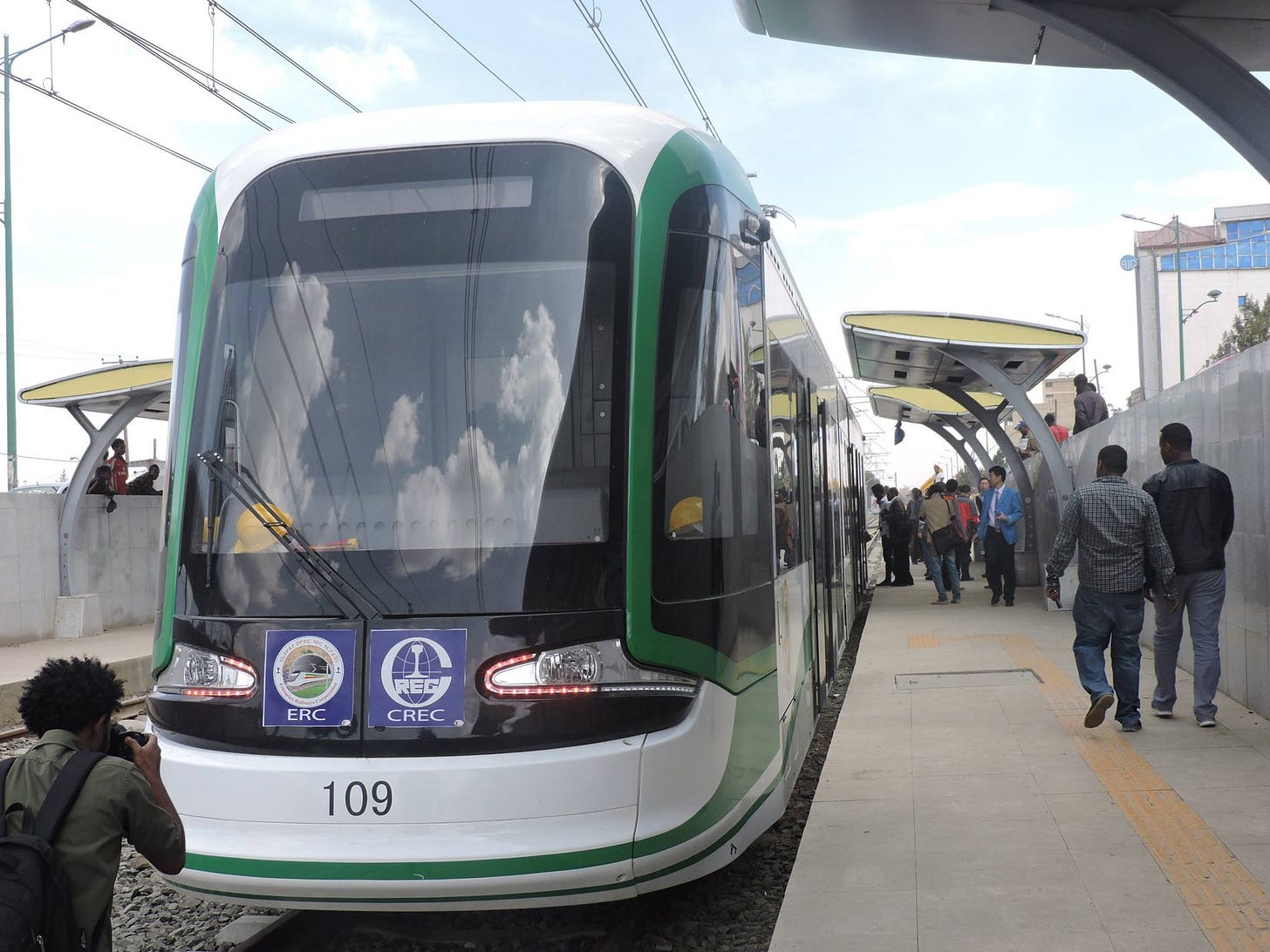
Apart from the incoherence of government policy as exemplified by the ongoing Zhongshan Fucheng fiasco, many African countries are vulnerable to abrupt unconstitutional changes in government via military coup d’états, leading to political instability that could impede the progress of budding Chinese projects.
The ball is obviously in the court of African countries. It is up to them to get their acts together and grab the mouth-watering opportunities offered by China. Might be a good idea for African governments to put aside their excellent skills in the art of financial mismanagement and corruption when those promised Chinese soft loans materialize. I know China would eventually be forced to write off those loans, as it has done several times in the past. Nevertheless, those governments should still resist the urge to disgrace themselves and their citizens.
Dear reader, if you like my work and feel like making a small donation, then kindly make for my Digital Tip Jar at Buy Me A Coffee. You can also click the yellow image above.




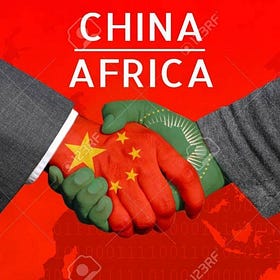


I concur with Cloud - another excellent article. The history is fascinating and educational. Mao Zedong's 1965 offer re TAZARA is eyeopening. Hopefully the West's economic war (currently!) on China will just strengthen ties. I suspect that ties with Russia will improve as well, after all in 2000 the West's project to destroy Russia was at its peak and look at how Russia has recovered. Inspiring to LDCs everywhere.
QK
Another excellent article.
I liked “Might be a good idea for African governments to put aside their excellent skills in the art of financial mismanagement and corruption when those promised Chinese soft loans materialize. I know China would eventually be forced to write off those loans, as it has done several times in the past. Nevertheless, those governments should still resist the urge to disgrace themselves and their citizens.”
Good advice.